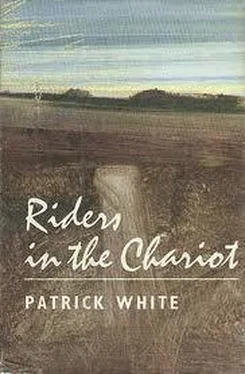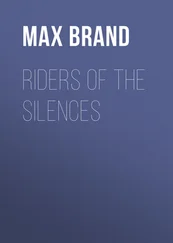The scrub, which had been pushed back, immediately began to tangle with Norbert Hare's wilfully created park, until, years later, there was his daughter, kneeling in a tunnel of twigs which led to Xanadu. Speckled and dappled, like any wild thing native to the place, she was examining her surroundings for details of interest. Almost all were, because alive, changing, growing, personal, like her own thoughts, which intermingled, flapping and flashing, with the leaves, or lay straight and stiff as sticks, or emerged with the painful stench of any crushed ant. Her hands, almost always dirty and scratched, from the constant need to plunge into operations of importance: encouraging a choked plant to shoot, freeing a fledgling from its shell, breaking an afterbirth, were now hung with dying ants, she observed with some distress. One slithered from her father's bloodstone ring, which she wore not as a memento of her father, but because its device officially confirmed her ownership of Xanadu.
Once or twice in the far past she had attempted to play with the ring on her father's hand. "It is not a toy," he had warned. "You must learn to respect property." So she had begun to. The mother, also, had worn rings, amethysts for preference. She favoured the twilight colours. Her clothes were in no way memorable, except perhaps her collection of woolly wraps, of such lightness they could not possibly have weighed upon her. The little girl was allowed to touch the clothes and rings her mother wore, even to grow rough with them. Too delicate to protest much, unless an issue exceeded the bounds of taste, Eleanor Hare wished most earnestly to do what was right, as wife and mother. "I am so afraid, Norbert, we shall not love our child enough. With my health. And your interests." "Oh, _love__!" the father replied, and laughed fit to shatter it forever. "I had no intention of causing you pain," his wife complained, before withdrawing into herself, under a big woolly shawl, a sage-green, and a hot-water bottle which she would hold to her neuralgia. "If only you would prevent her knocking over coffee cups," he requested, "especially into the laps of guests, and snapping off dahlias, and stamping up and down the landing while I am reading. I need a certain amount of silence while I am thinking something out." "It is only reasonable," she agreed, "that a child should learn to respect other people's needs." Anybody's reasonableness, and particularly his wife's, was what infuriated him most. So the child learned, as far as her natural clumsiness would allow, to move softly, like a leaf, and certain words she avoided, because they were breakable. The word LOVE, for instance, brittle as glass, and far more precious. Oh, she could go carefully enough in the end, in little, starched movements. And had learnt to love, even, but after her secret fashion, the labyrinths of corridors, the big, cool, greenish rooms, the golden walls of stone, the tunnels through the shrubberies.
And now Miss Hare got up, as far as her tunnel would allow, to continue struggling, bundling, pushing with the shield of her great wicker hat, to burst forth, not without shaking, and panting, and ridiculousness, into the presence of her noble love. On extricating herself from the embrace of twigs, there remained perhaps another two hundred yards of less grudgingly gracious green: a pomegranate almost gone to wood, a crab or two, spidery with first blossom, several sad, but soothing pines. The ground continued to rise, increasing her breathlessness, tearing her calves open as she climbed. All, whether within or without, was leading upward now. So Miss Hare came home, as always, for the first time. She stepped out beyond the trees where lawn began. Certainly the grass appeared a bit neglected, but the eyes, and not necessarily the eyes of a lover, were invariably transfixed by their first glimpse of Xanadu. Miss Hare herself had almost crumbled as she stood to watch her vision form.
SHE LIKED to come downstairs early. She would even get up in the dark, bumping things before she found her balance. She liked to come down, and sit, and listen to the house, after her own footsteps had died away, and the sound of the primus on which she had brewed a pot of tea. Then, she would sit and wrinkle her nose at the smell of kerosene, while she thawed out, if it were winter, or relaxed in summer after the weight of the heavy nights. Later she would start to walk about, touching things. Sometimes she would move them: a goblet, or a footstool, and once a heavy buhl table, from which the brass had risen to set traps for clothes and flesh. But mostly she let things lie, out of respect. Or she would draw a curtain, cunningly, to look out at the spectacle of morning, when all that is most dense becomes most transparent, and the world is dependent on the eye of the beholder. Then Miss Hare's mouth would grow slack and loving as she formed the solid trunks of gums out of the grey embryos of trees. She was at her best early in the morning. Except on this one. She jerked the curtain. And it tore, uglily. A long tongue of gold brocade. But she did not stay to consider. It was several mornings since she had taken the postmistress into her confidence. It was the morning before the arrival of the housekeeper at Xanadu. "A housekeeper!" she said, feeling her knuckles to test their infirmity, and finding they were, indeed, infirm. A housekeeper, though, was less formidable than a person, and this was what Miss Hare dreaded most: an individual called Mrs Jolley, whose hips would assert themselves in navy blue, whose breathing would be heard, whose letters would lie upon the furniture addressed in the handwriting of daughters and nieces, telling of lives lived, unbelievably, in other places. It was frightening, frightening. Miss Hare often cried in private, not from grief, but because she found it soothing, and she did now. It was frightening, though. Naturally she found it impossible to like human beings, if only on account of their faces, to say nothing of their habit of relating things that had never happened and then believing that they had. Children were perhaps the worst, because they had not yet grown insincere, and insincerity does blunt the weapons of attack. Possible exceptions were those children who grew up in one's vicinity, almost without one's noticing, just being around; that was delicious, like air. Best of all Miss Hare liked those who never expected what they would not receive. She liked animals, birds, and plants. On these she would expend her great, but pitiable love, and because that was not expected, it ceased to be pitiable. Once, it was related, a naked nestling had fallen into her lap, and she had reared it by some mysterious method of her own, warming it down her front, it was suspected, and ejecting juices into its beak from her mouth. The nestling had grown into a dove. Some of the Godbold children had been shown it. Then it flew away, of course, but would return sometimes, Miss Hare told. She would talk to it. Everybody except the Godbold kids thought it a lot of rot, Miss Hare talking to birds. But you could learn, she insisted. Miss Hare said you could learn to do anything, provided you wanted to, but there were an awful lot of things you did not want enough. Like learning to love a human being. Like the housekeeper, whom the telegram and her own increasing infirmity were bringing to Xanadu. "Ah, no, no, no!" she protested and whimpered in the cold, early-morning air. And the house repeated it after her.
Most of those landowners who wished to show how rich they were had already gone on to build in brick at the time when Norbert Hare decided to cut his dash in stone. To Mr Hare, brick was plain ugly; it did not please him a little bit, and what was Xanadu to suggest, if not the materialization of beauty, and climax of his pleasure? _Pleasure__ is a shocking word in societies where the most luxurious aspirations are disguised as humble, moral ones.
Читать дальше












